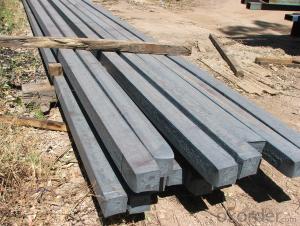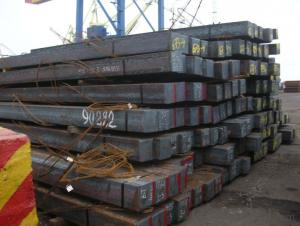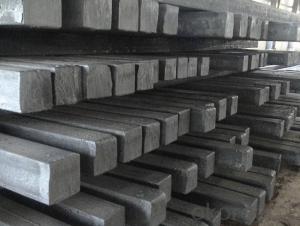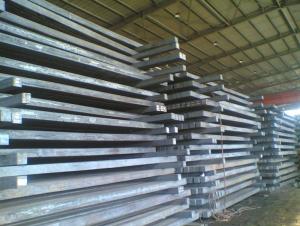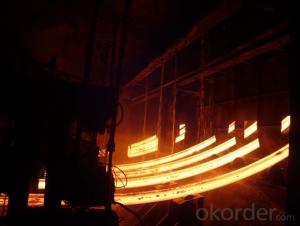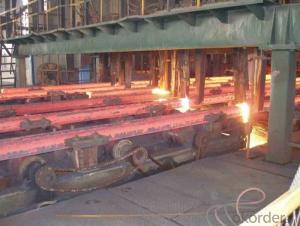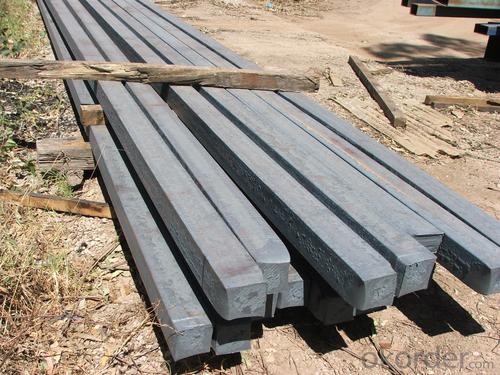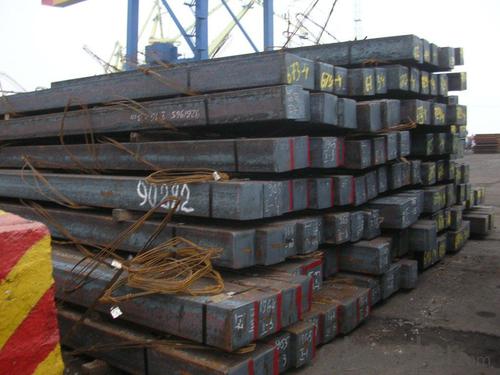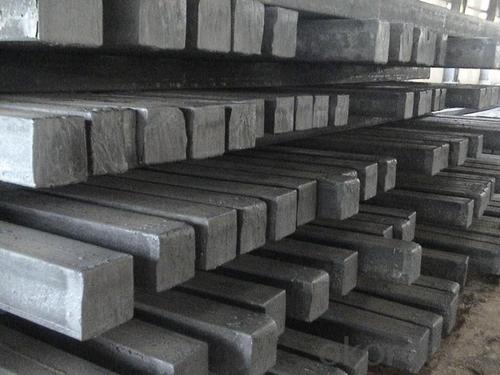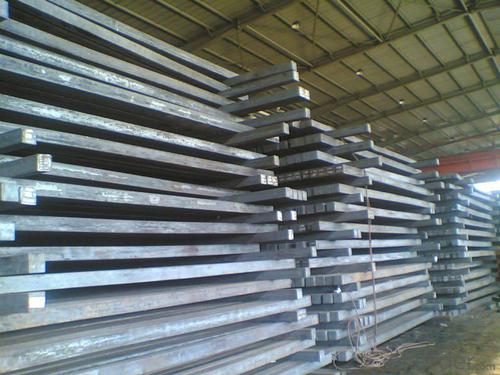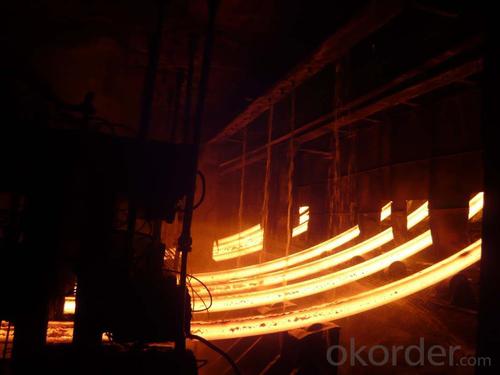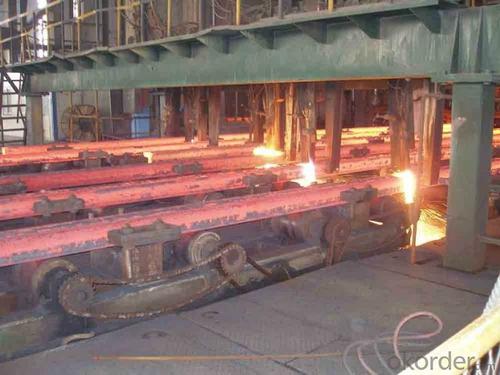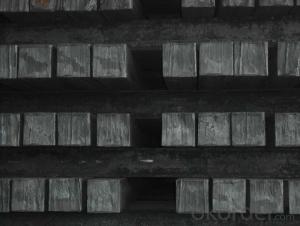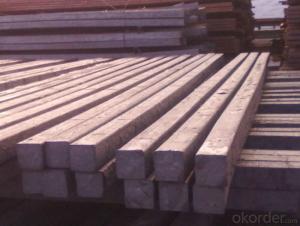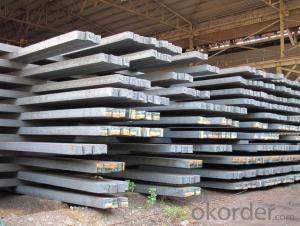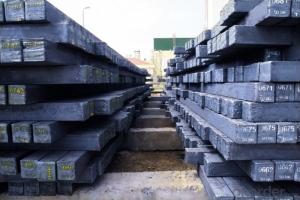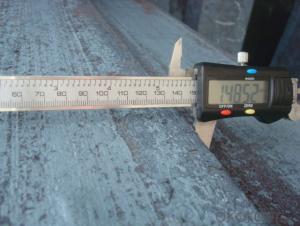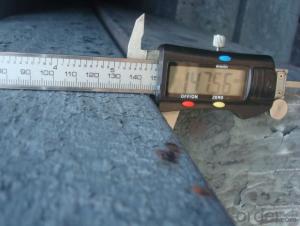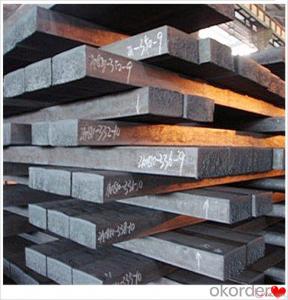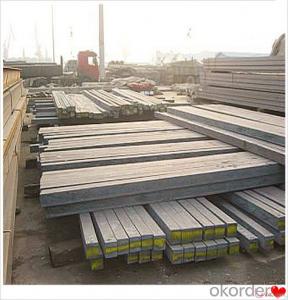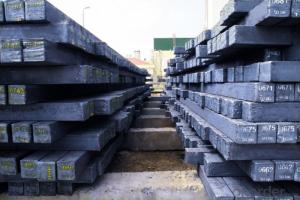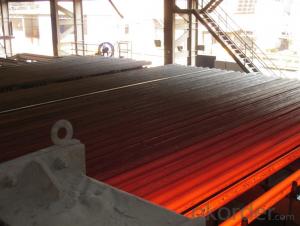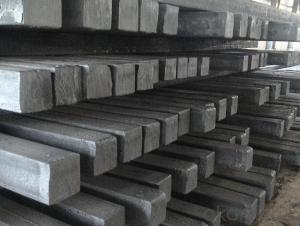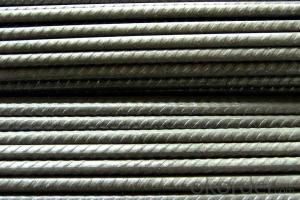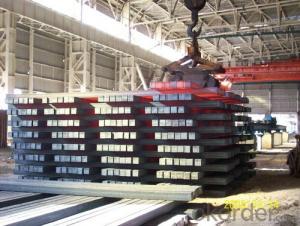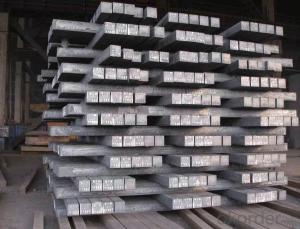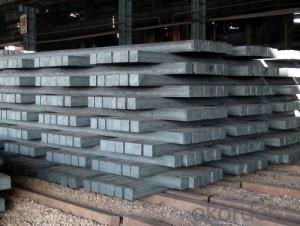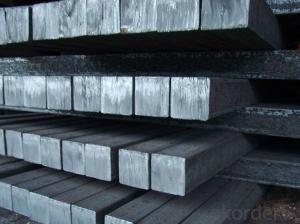Hot Rolled Square Steel Billet 3SP Standard 185mm
- Loading Port:
- Shanghai
- Payment Terms:
- TT OR LC
- Min Order Qty:
- 2000 m.t.
- Supply Capability:
- 10000 m.t./month
OKorder Service Pledge
OKorder Financial Service
You Might Also Like
Structure of Hot Rolled Square Steel Billet 3SP Standard 185mm
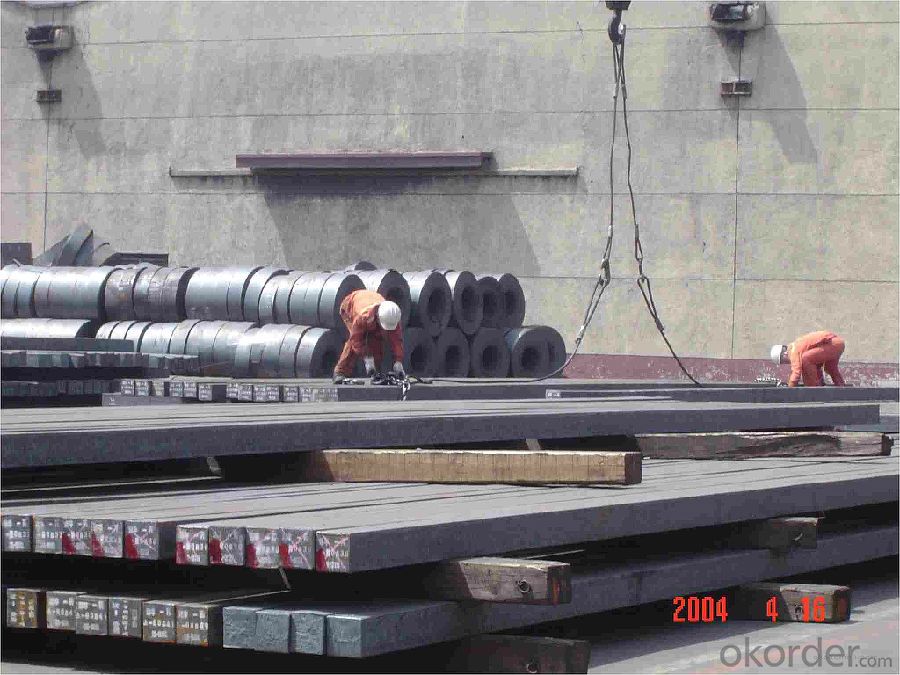
Description of Hot Rolled Square Steel Billet 3SP Standard 185mm
PPGI is made by cold rolled steel sheet and galvanized steel sheets as baseplate, through the surface pretreatment (degreasing, cleaning, chemical conversion processing), coated by the method of continuous coatings (roller coating method),
and after roasting and cooling. Zinc coating: Z60, Z80, Z100, Z120, Z180, Z275, G30, G60, G90
Alu-zinc coating: AZ60, AZ80, AZ100, AZ120, AZ180, G30, G60, G90
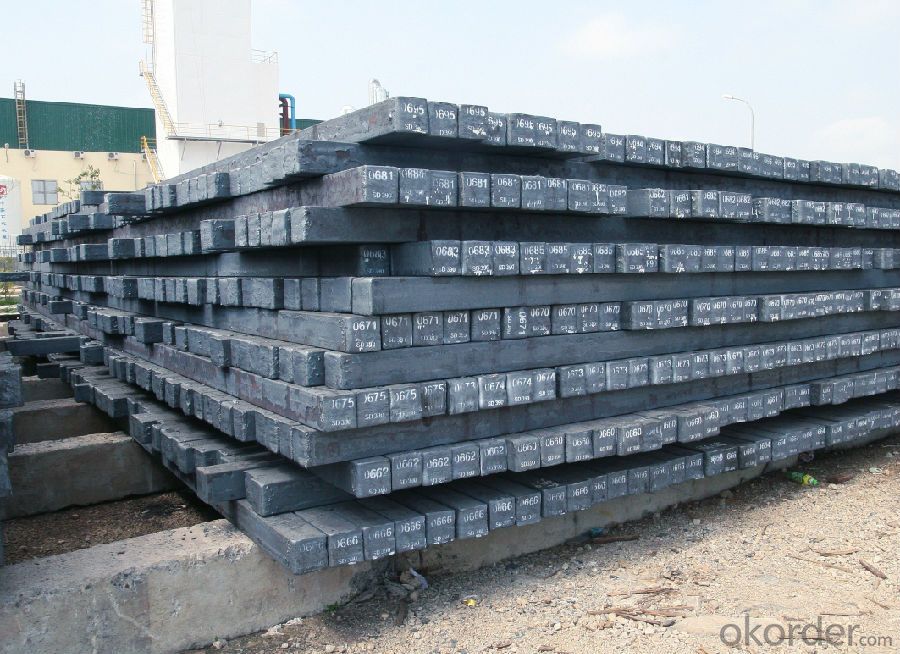
Main Feature of Hot Rolled Square Steel Billet 3SP Standard 185mm
1) Excellent corrosion resistance: The zinc layer provides a good protection of Pre-painted Galvanizeed Steel Sheet.
2) High heat resistance: The reflective surface of the material aids in efficiently reflecting the sunlight away and in turn reducing the amount of heat transmitted. The thermal reflectivity converts into energy savings.
3) Aesthetics: Pre-Painted Galvanized steel sheet is available in plethora of patterns and multiple sizes as per the requirements that given by our customers.
4) Versatility: can be used in the various areas.Standard seaworthy export packing: 3 layers of packing, inside is kraft paper, water plastic film is in the middle and outside GI steel sheet to be covered by steel strips with lock, with inner coil sleeve.
Applications of Hot Rolled Square Steel Billet 3SP Standard 185mm
1) Automotive bodies: filters, fuel tanks, etc.
2) Construction materials: roofings, welding pipes,
3) Electric and electronic appliances: computer cans, etc.
4) Steel cans: containers, etc.
5) Steel furniture: washing machines, refrigerators, microwaves, etc.
6) Drums
7) Office equipment: printer, recorders, etc.
8) Motors and transformers
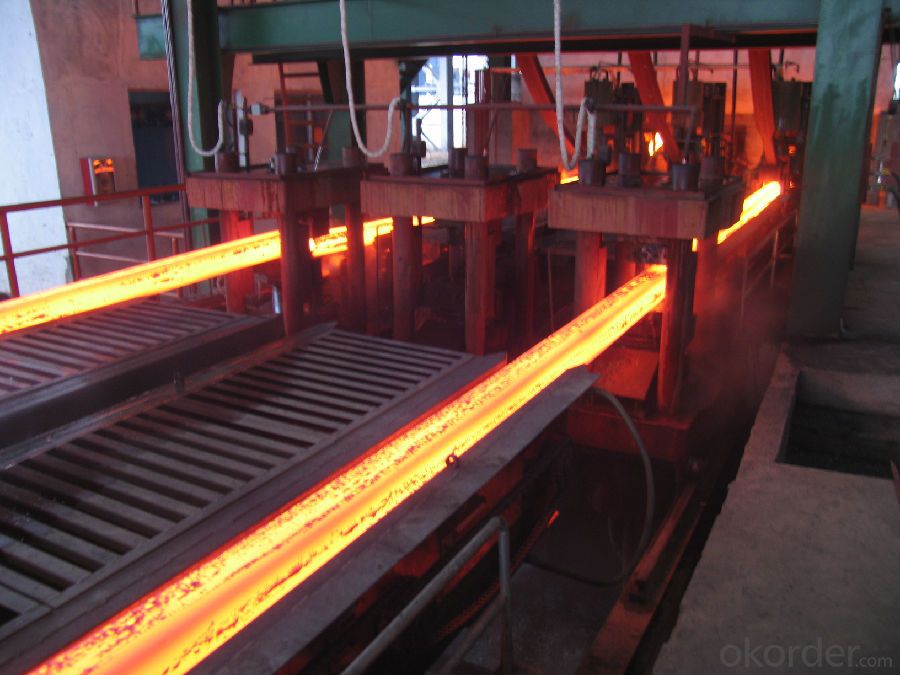
Specifications of Hot Rolled Square Steel Billet 3SP Standard 185mm
| Classified symbol | Yield Point Minimum N/mm2 | Tensile Strength Minimum | Elongation Minimum % | Application | ||||
| N/mm2 | Nominal Thickness mm (t) | |||||||
| JIS | Yogic | 0.25-0.4 | 0.4-0.6 | 0.6-1.0 | 1.0-1.6 | |||
| G3312 | specification | |||||||
| CGCC | CGCC | -205 | -270 | -20 | -21 | -24 | -24 | Commercial |
| CGCD | CGCD | --- | 270 | --- | 27 | 31 | 32 | Drawing |
| --- | CG340 | 245 | 340 | 20 | 20 | 20 | 20 | Structural |
| CGC400 | CG400 | 295 | 400 | 16 | 17 | 18 | 18 | Structural |
| CGC440 | CG440 | 335 | 440 | 14 | 15 | 16 | 18 | Structural |
| CGC490 | CG490 | 365 | 490 | 12 | 13 | 14 | 16 | Structural |
| CGC570 | CG570 | 560 | 570 | --- | --- | --- | --- | Structural |
| ASTM Designation | Yield Point Minimum | Tensile Strength Minimum | Elongation Minimum % | Application | Q/BQB 445-2004(China standard) | ASM A653/A653M | JISG 3312 | |
| ksi(MPa) | ksi(MPa) | TDC51D+Z | (CS TYPE A+Z) | CGCC | ||||
| A653(M)-99 CS TYPE A,B,C | --- | --- | --- | Commercial | TDC52D+Z | CGCD | ||
| A653(M)-99 FS | --- | --- | --- | Lock Forming | TS250GD+Z | (G250+Z) | - | |
| A653(M)-99 DS | --- | --- | --- | Drawing | TS300GS+Z | (G300+Z) | CGC 400 | |
| A653(M)-99 SS Grade33(230) | 33(230) | 45(310) | 20 | Structural | TS350GD+Z | (G350+Z) | CGC490 | |
| A653(M)-99 SS Grade37(255) | 37(255) | 52(360) | 18 | Structural | TS550GD+Z | (G550+Z) | CGC570 | |
| A653(M)-99 SS Grade40(275) | 40(275) | 55(380) | 16 | Structural | ||||
| A653(M)-99 SS Grade50(345) | 50(345) | 65(450) | 12 | Structural | ||||
| A653(M)-99 SS Grade80(550) | 80(550) | 82(570) | --- | Structural | ||||
FAQ of Hot Rolled Square Steel Billet 3SP Standard 185mm
We have organized several common questions for our clients,may help you sincerely:
1. How Can I Visit There?
Our company is located in Tianjin City, China, near Beijing. You can fly to Tianjin Airport Directly. All our clients, from home or aboard, are warmly welcome to visit us!
2. How Can I Get Some Sample?
We are honored to offer you sample.
3. Why choose CNBM?
1, ISO, BV, CE, SGS approved.
2, Competitive price and quality.
3, Efficient service team online for 24 hours.
4, Smooth production ability(50000tons/month) .
5, quick delivery and standard exporting package.
6, Flexible payment with T/T, L/C, Paypal, Kunlun bank, etc.
- Q: What are the different types of coating processes used for protecting steel billets?
- There are several different types of coating processes used for protecting steel billets. These include hot-dip galvanizing, electroplating, powder coating, and thermal spray coating. Each process offers unique advantages and is chosen based on factors such as the desired level of corrosion resistance, cost-effectiveness, and the specific application requirements.
- Q: What are the different methods of steel billet surface inspection?
- There are several methods of steel billet surface inspection, including visual inspection, magnetic particle inspection, ultrasonic testing, and eddy current testing. Visual inspection involves examining the surface for any visible defects or irregularities. Magnetic particle inspection uses magnetic fields and iron particles to detect surface cracks or discontinuities. Ultrasonic testing uses high-frequency sound waves to detect internal defects or anomalies in the billet's surface. Eddy current testing involves passing an electrical current through the billet and detecting changes in the current caused by surface defects. These methods help ensure the quality and integrity of steel billets before further processing or use.
- Q: How is the quality of steel billets determined?
- The quality of steel billets is determined through a combination of physical and chemical tests. These tests are performed to ensure that the steel meets the required standards and specifications for its intended use. One of the primary methods to determine the quality of steel billets is through chemical analysis. This involves testing the composition of the steel to ensure it meets the desired levels of different elements such as carbon, manganese, silicon, and others. The chemical composition plays a crucial role in determining the strength, hardness, and other mechanical properties of the steel. In addition to the chemical analysis, various physical tests are conducted to assess the quality of steel billets. These tests include measuring the dimensions, weight, and straightness of the billets to ensure they meet the specified tolerances. Surface inspection is also performed to detect any defects, such as cracks, seams, or surface irregularities that could affect the performance of the steel. Mechanical tests are another crucial aspect of determining the quality of steel billets. These tests evaluate the mechanical properties of the steel, including its strength, ductility, toughness, and hardness. Tensile tests are commonly conducted to measure the maximum load a steel billet can withstand before breaking or deforming. Impact tests are also performed to assess the steel's ability to resist sudden shocks or impacts. Furthermore, non-destructive testing techniques are used to detect any internal defects or inconsistencies in the steel billets. These methods include ultrasonic testing, magnetic particle inspection, and radiographic testing. These tests help ensure that the steel is free from any hidden defects that could compromise its quality or structural integrity. Overall, the quality of steel billets is determined through a comprehensive evaluation that includes chemical analysis, physical tests, mechanical tests, and non-destructive testing. These methods ensure that the steel meets the required standards and specifications, providing assurance of its reliability and suitability for various applications.
- Q: How does the quality of steel billets affect the quality of the final product?
- The quality of steel billets plays a critical role in determining the quality of the final steel product. Steel billets are semi-finished products, typically produced through a continuous casting process, which serve as the raw material for various downstream steel products. Firstly, the chemical composition of the steel billets greatly impacts the final product's quality. Steel is an alloy composed primarily of iron and carbon, with the addition of various other elements such as manganese, chromium, nickel, and others. The presence and precise amount of these alloying elements in the billets significantly influence the final steel's properties, including strength, hardness, ductility, and corrosion resistance. Any variation or deviation in the chemical composition of the billets can lead to an undesirable alteration in the final product's characteristics. Secondly, the physical properties of steel billets, such as their size, shape, and internal structure, directly affect the quality of the final steel product. The size and shape of the billets determine the dimensions and geometry of the end product, ensuring proper fit and functionality. Furthermore, the internal structure of billets, including the absence of defects like cracks, voids, or inclusions, is crucial for producing high-quality steel products. Any imperfections present in the billets can propagate and cause failures, reducing the strength and overall quality of the final product. Additionally, the manufacturing process of steel billets also influences the final product's quality. Factors such as cooling rate, casting speed, and temperature control during the continuous casting process can impact the microstructure and overall homogeneity of the billets. Proper process control and optimization are essential to ensure that the billets possess the desired metallurgical properties, such as uniform grain structure and absence of segregation or impurities. Moreover, the quality of steel billets directly impacts the efficiency and cost-effectiveness of subsequent steel processing operations. If the billets have a high degree of dimensional accuracy, it reduces the need for excessive material removal during subsequent machining or shaping processes. This results in higher material yield, reduced waste, and improved overall productivity. In summary, the quality of steel billets significantly influences the quality of the final steel product. The chemical composition, physical properties, and manufacturing process of billets all play crucial roles in determining the end product's characteristics. By ensuring high-quality steel billets, manufacturers can produce steel products that meet stringent industry standards, possess desired mechanical properties, and exhibit superior performance in various applications.
- Q: The role of carbon content in steels
- Carbon is the main alloying element of iron and steel, so steel is also called iron carbon alloy. The main role of carbon in steel is to:1., the formation of solid solution tissue, improve the strength of steel, such as ferrite and austenitic structure, are dissolved in carbon;
- Q: How are steel billets used in the production of railway infrastructure?
- The production of railway infrastructure relies heavily on steel billets, which are crucial for creating various railway components such as rails, sleepers, and fasteners. These semi-finished steel products undergo a hot rolling process to shape them into long and narrow sections with consistent cross-sections, serving as the foundation for railway tracks. Rails, one of the primary uses of steel billets in railway infrastructure, are formed from the processed billets. These rails, available in different lengths and dimensions, provide stability and a sturdy platform for trains to run on. The strength and durability of steel ensure that the tracks can withstand heavy loads and frequent traffic. Steel billets are also used to manufacture sleepers, which act as horizontal supports for the rails. Concrete or wooden sleepers are created from the shaped and formed billets and are laid on the track bed to maintain the alignment and gauge of the tracks. Sleepers play a vital role in distributing the weight of trains and providing stability. Furthermore, steel billets are essential in producing fasteners like bolts, nuts, and clips. These fasteners secure the rails to the sleepers, ensuring that they remain in position during train operations. Steel's strength and resilience make it a reliable material for these critical components, which must withstand significant stress and vibrations. In conclusion, steel billets are indispensable in the production of railway infrastructure. Their versatility and strength make them suitable for creating rails, sleepers, and fasteners, which are vital for a reliable and robust railway system. Without steel billets, the construction and maintenance of railway tracks would be impossible, impacting the efficiency and safety of train operations.
- Q: How do steel billets affect the overall cost of a project?
- Steel billets can have a significant impact on the overall cost of a project. Firstly, the cost of steel billets themselves can vary depending on factors such as the size, grade, and market demand. Higher quality or specialized steel billets may come at a higher cost, while lower quality or readily available billets may be more cost-effective. Additionally, the quantity of steel billets required for a project can greatly affect the overall cost. Larger projects that require a substantial amount of steel may have to purchase a greater number of billets, which can increase the cost. On the other hand, smaller projects with fewer steel requirements may be able to minimize costs by purchasing a smaller quantity of billets. Transportation and logistics also play a role in the cost of steel billets. The distance between the billet supplier and the project site, as well as the availability of transportation options, can impact the overall cost. Shipping costs, handling fees, and other associated expenses can add to the final cost of the project. Furthermore, the quality and suitability of the steel billets for the specific project requirements can influence costs. Using low-quality or unsuitable billets may result in delays, rework, or even failure of the project, leading to additional expenses. Therefore, it is crucial to ensure that the chosen steel billets meet the necessary specifications and standards, even if they come at a higher initial cost. Lastly, the overall market conditions and fluctuations in the steel industry can affect the cost of steel billets. Factors such as supply and demand, currency exchange rates, and global economic trends can impact the price of steel billets, thereby influencing the overall project cost. In summary, the cost of steel billets can have a significant impact on the overall cost of a project. Factors such as the cost of the billets themselves, the quantity required, transportation and logistics, quality and suitability, and market conditions all contribute to the final cost. Therefore, careful consideration and analysis of these factors are essential to effectively manage and budget for steel billets in a project.
- Q: How are steel billets used in the production of power generation equipment?
- The strength, durability, and versatility of steel billets make them essential in the manufacturing of power generation equipment. This equipment, which includes turbines and generators, requires robust and dependable components to withstand tough operating conditions and ensure uninterrupted power supply. Steel billets, small semi-finished steel products, serve as the raw material for producing different parts of power generation equipment. They are melted and cast into specific shapes to create turbine blades, shafts, casings, and rotors. The utilization of steel billets in power generation equipment guarantees strong structural integrity due to the excellent mechanical properties of steel. It possesses high tensile strength, enabling it to endure extreme rotational forces and pressures within turbines and generators. Moreover, steel has good resistance against corrosion and high temperatures, making it ideal for use in power generation equipment that operates in harsh environments. Additionally, steel billets can be easily machined and welded, allowing for precise manufacturing and assembly of intricate parts. This adaptability in shaping and joining steel billets facilitates the production of customized components tailored to the specific requirements of power generation equipment. In conclusion, steel billets are crucial in the manufacturing of power generation equipment as they provide a robust, durable, and versatile material for creating various components. Their use ensures the reliability and durability of power generation equipment, enabling efficient and uninterrupted power generation.
- Q: How do steel billets contribute to the manufacturing of medical devices?
- Steel billets are an essential raw material in the manufacturing of medical devices due to their excellent strength, durability, and corrosion resistance properties. These billets serve as the starting point for various manufacturing processes such as forging, machining, and casting, which are crucial for creating intricate and precise components used in medical devices. Additionally, steel billets are often used to produce implants, surgical instruments, and other critical medical equipment, ensuring the highest level of quality and reliability in the healthcare industry.
- Q: What are the main factors affecting the fatigue strength of alloy steel billets?
- The main factors affecting the fatigue strength of alloy steel billets include the composition of the alloy, the presence of impurities or defects, the heat treatment process, surface conditions, and the presence of residual stresses. Additionally, the applied load, frequency, and environmental conditions can also influence the fatigue strength of alloy steel billets.
Send your message to us
Hot Rolled Square Steel Billet 3SP Standard 185mm
- Loading Port:
- Shanghai
- Payment Terms:
- TT OR LC
- Min Order Qty:
- 2000 m.t.
- Supply Capability:
- 10000 m.t./month
OKorder Service Pledge
OKorder Financial Service
Similar products
Hot products
Hot Searches
Related keywords
